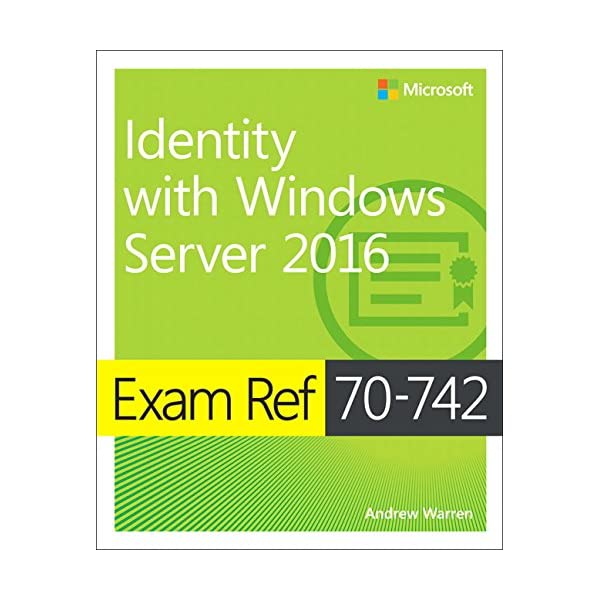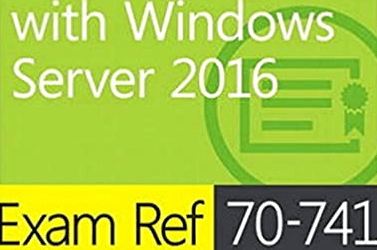🌟 New Year Offer 🌟
Celebrate 2026 with 30% OFF on all products! Use code: NEWYEAR2026. Hurry, offer ends soon!
This training series focuses on the identity functionality in Windows Server 2016. It covers the installation and configuration of Active Directory Domain
Microsoft – 70-742 Identity in Windows Server 2016

This training series focuses on the identity functionality in Windows Server 2016. It covers the installation and configuration of Active Directory Domain Services (AD DS), in addition to Group Policy implementation for non-Nano Server environments. It also covers functionality such as Active Directory Certificate Services (AD CS), Active Directory Federations Services (AD FS), and Web Application proxy implementations.
Get immediately download Microsoft – 70-742 Identity in Windows Server 2016
This series, along with the 70-740 and 70-741 series, will prepare you to take the MCSA: Windows Server 2016 exams. Taking the 70-744 series will then prepare you to take the MCSE: Cloud Platform and Infrastructure exams.
Course Curriculum
Course Introduction
Course Introduction (3:08)
Instructor Introduction (1:24)
Chapter 01 – Installing and Configuring Domain Controllers
Chapter 01 Introduction (1:10)
Topic A: Overview of Active Directory Domain Services (0:50)
Information Protection Concepts (3:28)
Identity and Access (IDA) (1:37)
Authentication and Authorization (5:20)
AD DS Terms (2:50)
Access Tokens (2:10)
Access Control Lists (2:07)
The Kerberos Logon Process (6:04)
Workgroup vs. Domain (2:29)
Understanding AD DS Domains (2:11)
AD DS Components and Concepts (1:03)
Active Directory Database (2:21)
Physical Data Store (1:33)
Logical Partitions (4:23)
Active Directory Schema (4:18)
Domains (3:09)
Trees and Forests (3:00)
Organizational Units (2:28)
AD DS Sites (2:26)
Controlling Replication (0:51)
Trust Relationships (3:40)
Topic B: Overview of Domain Controllers (0:18)
Introducing Domain Controllers (1:59)
Global Catalog Servers (4:01)
Read-Only Domain Controllers (1:40)
FSMO Roles (7:06)
Demo – Working with FSMO Roles (6:48)
Locating Domain Controllers (3:25)
Demo – Viewing SRV Records (4:25)
Topic C: Deploying Domain Controllers (0:12)
Reasons for Multiple Domain Controllers (2:46)
Installing from Server Manager (2:53)
Considerations for Installing Domain Controllers (3:09)
Demo – Installing a Domain Controller (9:12)
Installing on Server Core (2:30)
Demo – Promoting a Server Core DC (14:41)
Upgrading Domain Controllers (2:00)
Additional Installation Options (1:34)
Cloning Domain Controllers (2:37)
Demo – Cloning Domain Controllers (17:31)
Chapter 01 Summary (1:39)
Chapter 01 Review (0:10)
Chapter 01 Quiz
Chapter 02 – Managing Active Directory Objects
Chapter 02 Introduction (1:01)
Topic A: Overview of AD DS Object Management (0:18)
Understanding AD DS Objects (2:00)
Names for AD DS Objects (2:50)
Management Tools (4:06)
Demo – Overview of AD DS Management Tools (13:34)
Topic B: Managing User Accounts (0:18)
The Importance of the User Account (1:49)
Naming Considerations (3:04)
Configuring User Passwords (3:28)
Creating User Accounts (2:06)
Demo – Creating AD DS Users (32:38)
Managing User Attributes (1:55)
User Account Management (1:47)
Demo – Managing Users (20:28)
Topic C: Managing Groups (0:16)
Group Types and Scopes (3:12)
Types of Groups (2:00)
Group Scopes (1:45)
Domain Local and Global Groups (1:41)
Universal Groups (0:36)
Group Nesting (0:58)
Group Naming Considerations (1:25)
Creating and Configuring Groups (1:14)
Demo – Creating and Configuring Groups (14:38)
Introduction to Default Groups (1:39)
Identifying Default Groups (2:32)
Administrative Groups (0:46)
Demo – Configuring Default Groups (3:56)
Using Special Identities (2:27)
Strategies for Using Groups (4:42)
Group Nesting Strategies (6:18)
Demo – Group Nesting (15:59)
Topic D: Managing Computer Accounts (0:20)
Introduction to Computer Accounts (2:10)
Creating Computer Accounts (2:01)
Working with Secure Channel Passwords (3:20)
Offline Domain Joins (2:03)
Demo – Working with Computer Accounts (9:57)
Topic E: Managing Organizational Units (0:42)
Planning Organizational Units (5:04)
OU Hierarchy Considerations (0:52)
Creating OUs (1:46)
Demo – Creating an OU Hierarchy (10:37)
Object Security in AD DS (1:21)
AD DS Object Permissions (1:34)
Demo – Viewing Object Permissions in Active Directory (5:40)
Delegating Administrative Control (1:52)
Modifying Delegated Rights (1:32)
Best Practices for Administrative Delegation (1:25)
Demo – Delegating Administrative Control (8:34)
Chapter 02 Summary (1:29)
Chapter 02 Review (0:10)
Chapter 02 Quiz
Chapter 03 – Securing Active Directory Domain Services
Chapter 03 Introduction (1:25)
Topic A: Securing Domain Controllers (0:13)
Understanding Security Risks (4:13)
Using Group Policy (1:46)
Group Policy Security Settings (2:14)
Securing the Authentication Process (3:48)
Physical Access Security (3:05)
Branch Office Domain Controllers (2:06)
RODC Features (3:28)
RODC Limitations and Considerations (1:56)
Deploying RODCs (2:17)
Demo – Installing an RODC (8:13)
Password Replication Policies (2:03)
Topic B: Implementing Account Security (0:16)
Account Security in Windows Server 2016 (2:04)
Complexity Options (1:35)
Password Policies (2:39)
Account Lockout Policies (3:17)
Configuring Domain Password and Lockout Policies (1:23)
Demo – Configuring Account Policies in Group Policy (5:45)
Configuring Fine -Grained Password Policies (1:35)
Configuring Fine -Grained Password Policies Part 2 (2:31)
Configuring Fine -Grained Password Policies Part 3 (1:31)
Demo – Configuring Fine -Grained Password Policies (12:01)
Restricted Groups (2:03)
Protected Users Security Groups (2:03)
Authentication Policies (2:58)
Authentication Silos (1:12)
Enhancing Password Authentication (4:13)
Topic C: Auditing AD DS (0:12)
Utilizing Auditing (1:41)
The Purpose of Auditing (1:35)
Types of Events (4:04)
Auditing Goals (1:05)
Auditing File and Object Access (2:26)
Advanced Auditing (2:07)
Demo – Configuring Auditing (12:59)
Topic D: Configuring Managed Service Accounts (0:14)
Overview of Service Accounts (2:36)
Challenges to Managing Service Accounts (1:40)
Get immediately download Microsoft – 70-742 Identity in Windows Server 2016
Managed Service Accounts (1:08)
Group MSAs (1:01)
Demo – Configuring Group MSAs (7:08)
Chapter 03 Summary (1:49)
Chapter 03 Review (0:10)
Chapter 03 Quiz
Chapter 04 – Working with Complex AD DS Infrastructures
Chapter 04 Introduction (1:52)
Topic A: Overview of Advanced AD DS Deployments (0:13)
Domain Boundaries (3:28)
Forest Boundaries (1:32)
Reasons for Implementing Multiple Domains (3:21)
Reasons for Implementing Multiple Forests (2:39)
Deploying Domain Controllers in Azure (6:26)
Managing Objects (2:47)
Topic B: Deploying a Distributed AD DS Environment (0:13)
Domain Functional Levels (2:35)
Forest Functional Levels (1:08)
Deploying AD DS Domains (1:40)
DNS Considerations (4:52)
UPN Considerations (1:59)
Demo – Deploying a Child Domain (5:55)
Understanding Trust Relationships (3:05)
Types of Trusts (3:23)
How Trusts Work (2:43)
Forest Trusts (1:52)
Advanced Trust Settings (3:49)
Demo – Configuring a Forest Trust (11:20)
Topic C: Overview of AD DS Replication (0:20)
AD DS Partitions (1:34)
AD DS Replication (3:31)
Types of Replication (2:46)
Resolving Replication Conflicts (3:34)
Topic D: Configuring AD DS Sites (0:23)
Reasons for Sites (2:46)
Planning for Sites (2:01)
Overview of Sites and Subnets (1:49)
Moving Domain Controller Accounts (0:49)
Domain Controller Placement (3:43)
Demo – Creating Sites (7:59)
Controlling Inter -Site Replication (1:46)
Defining Site Links (1:15)
Site Links (1:29)
Site Link Properties (2:13)
Demo – Creating Site Links (6:46)
Bridgehead Servers (1:25)
Bridging Site Links (1:47)
Monitor and Manage Replication (1:34)
Chapter 04 Summary (1:08)
Chapter 04 Review (0:10)
Chapter 04 Quiz
Chapter 05 – Implementing Group Policy
Chapter 05 Introduction (1:12)
Topic A: Overview of Group Policy (0:11)
What is Group Policy? (2:22)
Group Policy Settings (1:39)
Local Group Policies (1:47)
Policies vs. Preferences (2:16)
Demo – Examining Policy Settings (6:23)
Domain Policies (2:43)
GPO Storage (1:37)
Linking GPOs (1:28)
GPO Processing Order (2:03)
Controlling Inheritance (1:38)
Determining Inheritance (0:45)
GPO Link Options (2:18)
Security Filtering (3:50)
WMI Filtering (2:20)
Refreshing Policies (2:12)
Other Processing Options (3:28)
Topic B: Creating and Configuring GPOs (0:12)
Creating GPOs (1:17)
er GPOs (1:58)
Administrative Templates (3:37)
Group Policy Preferences (1:12)
Demo – Creating and Configuring Policies (37:40)
Group Policy Management (0:42)
Delegation of Control (2:05)
Demo – Managing GPOs (7:54)
Topic C: Monitoring and Troubleshooting Group Policy (0:23)
Troubleshooting Group Policy Application (3:05)
Troubleshooting Group Policy Application (2:48)
Demo – Troubleshooting Group Policy Application (11:40)
Topic D: Security Management Using Group Policy (1:03)
Preview
Security Management Using Group Policy (0:50)
Configuring User Rights (1:24)
Managing Security Option s (1:52)
User Account Control (2:09)
Demo – Managing Security Options (5:43)
Controlling Applications (1:09)
Software Restriction Policies (3:23)
Security Levels (1:09)
AppLocker (1:41)
Support for AppLocker (0:58)
AppLocker Rules (1:55)
Creating Default Rules (3:00)
Demo – Controlling Applications Using Group Policy (11:35)
Configuring the Windows Firewall (1:58)
Windows Firewall with Advanced Security (1:31)
Firewall Profiles (1:03)
Creating Firewall Rules (0:24)
Configuring the Windows Firewall (0:52)
Types of Rules (1:31)
Connection Security Rules (1:43)
Demo – Configuring Firewalls using Group Policy (7:30)
Topic E: Managing User Environments (0:24)
Using Scripts in Group Policy (1:18)
What is Folder Redirection? (1:53)
Common Folders for Redirection (1:06)
Redirection Options (1:38)
Demo – Configuring Folder Redirection (5:38)
Deploying Software Using Group Policy (2:09)
How Software Distribution Works (0:44)
Using Windows Installer (1:35)
Software Life Cycle (0:58)
Deploying Software (1:05)
Deployment Options (2:04)
Maintaining Software through Group Policy (0:56)
Removing Software Deployments (0:44)
Chapter 05 Summary (1:42)
Chapter 05 Review (0:10)
Chapter 05 Quiz
Chapter 06 – Understanding Microsoft Azure AD and Directory Synchronization
Chapter 06 Introduction (1:19)
Topic A: Planning Directory Synchronization (0:19)
Overview of Azure AD (5:38)
Limitations of AD DS (2:37)
Extending AD DS Authentication (3:35)
Comparing AD DS and Azure AD (1:58)
Authentication Options (4:54)
Planning Directory Synchronization (2:57)
Enabling AD DS Synchronization (2:03)
Topic B: Implementing Azure AD Connect (0:10)
What is Azure AD Connect? (1:50)
Azure AD Connect Requirements (4:01)
Azure AD Connect Express Settings (1:06)
Azure AD Connect Custom Installation (2:06)
Monitoring Azure AD (1:06)
Privileged Identity Management (1:23)
Topic C: Managing Identities with Directory Synchronization (0:06)
Managing Users (8:01)
Managing Groups (0:55)
Filtering Azure AD Connect (2:03)
Monitoring Directory Synchronization (1:46)
Troubleshooting Directory Synchronization (1:24)
Chapter 06 Summary (1:29)
Chapter 06 Review (0:10)
Chapter 06 Quiz
Chapter 07 – Monitoring and Recovering AD DS
Chapter 07 Introduction (1:25)
Topic A: Monitoring AD DS (0:15)
Performance Monitoring Benefits (2:05)
Establishing Performance Baselines (2:13)
Introduction to Monitoring Tools (0:51)
Event Viewer (2:34)
Demo – Using Event Viewer (5:12)
Reliability Monitor (1:52)
Real -Time Monitoring (2:42)
Data Collector Sets (1:26)
Data Collection Points (0:49)
Common AD DS Counters (4:34)
Best Practices (2:48)
Topic B: Database Management (0:07)
Physical Data Store (2:59)
Using NTDSUtil (2:35)
AD DS Maintenance (1:27)
Topic C: Backup and Recovery in AD DS (0:11)
Disaster Recovery for Active Directory (1:26)
Backing Up Active Directory (4:17)
Using Backup Tools (0:40)
Backup Requirements (1:44)
Restoring Data (4:27)
Additional Restore Options (3:53)
Demo – Enabling the AD Recycle Bin (3:23)
Best Practices for Backup and Recovery (1:27)
Chapter 07 Summary (1:58)
Chapter 07 Review (0:10)
Chapter 07 Quiz
Chapter 08 – Implementing Active Directory Certificate Services
Chapter 08 Introduction (1:26)
Topic A: Overview of Public Key Infrastructure and AD CS (0:08)
What is a PKI? (1:38)
Encryption Types (2:05)
PKI Components (1:56)
PKI Enabled Applications (1:49)
Certificate Authorities (1:45)
CA Types (0:49)
Internal vs. External CAs (3:24)
AD CS in Windows Server 2016 (3:15)
Topic B: Deploying Certificate Authority Hierarchy (0:13)
Decision Factors for CA Hierarchy (0:39)
CA Hierarchy Roles (1:40)
Best Practices for CA Hierarchies (1:22)
Installing Root CAs (1:18)
Installing Root CAs Part 2 (1:16)
Demo – Installing a Root CA (8:01)
Installing Subordinate CAs (0:50)
Get immediately download Microsoft – 70-742 Identity in Windows Server 2016
Benefits of Using Subordinates (1:36)
Automating Installations (1:58)
Topic C: Administering Certificate Authorities (0:25)
Administration Tools (3:09)
Configuring CA Security (1:22)
Security Roles for CA Administration (1:58)
Policy and Exit Modules (1:29)
Certificate Revocation Lists (CRL) (2:37)
Publishing the CRL (0:57)
Publishing AIAs and CDPs (1:14)
Topic D: Deploying and Managing Certificates (0:08)
Digital Certificates (1:54)
Certificate Templates (1:08)
Template Versions in Windows Server 2016 (2:11)
Certificate Template Permissions (1:13)
Updating Templates (1:21)
Demo – Modifying and Enabling a Certificate Template (5:44)
Enrollment Types (2:02)
Manual Enrollment (0:58)
Automating Enrollment (0:36)
Autoenrollment Components (0:56)
Demo – Configuring Autoenrollment (7:22)
Credential Roaming (0:48)
Topic E: Managing Revocation and Distribution (0:22)
Certificate Revocation (1:24)
Online Responder (1:41)
Online Responder Process (0:50)
Comparing CRL and OCSP (1:32)
Configuring an Online Responder (1:01)
Topic F: Configuring Certificate Recovery (0:16)
Importance of Key Archival and Recovery (1:03)
Key Archival (1:27)
Data Recovery vs. Key Recovery (1:24)
Archival Methods (0:44)
Export Methods (0:46)
Automating Archival (1:01)
Recovering Lost Keys (1:11)
Chapter 08 Summary (1:57)
Chapter 08 Review (0:10)
Chapter 08 Quiz
Chapter 09 – Implementing Active Directory Federation Services (AD FS)
Chapter 09 Introduction (1:17)
Topic A: Overview of AD FS (0:10)
What is Identity Federation? (3:09)
Federation Benefits (1:35)
AD FS Components (2:13)
Additional AD FS Terms (4:03)
Identity Federation Scenarios (1:49)
Business to Business Scenario (1:54)
Business to Employee Scenario (0:46)
Business to Consumer Scenario (0:32)
New Features in Windows Server 2016 (1:30)
Topic B: Planning and Deploying AD FS (0:06)
AD FS Requirements (2:10)
Server Roles (2:03)
Planning High Availability (3:04)
AD FS Claims (2:34)
AD FS Claim Rules (3:38)
Trust Relationships (2:32)
Installing AD FS (2:59)
Demo – Installing AD FS (8:39)
Configuring Partners (3:35)
Home Realm Discovery (2:06)
Managing AD FS (1:53)
Topic C: Overview of Web Application Proxy (0:17)
Introducing the Web Application Proxy (2:49)
Web Application Proxy and AD FS Proxy (1:47)
Authentication Methods (2:02)
Publishing Software (1:26)
Chapter 09 Summary (1:05)
Chapter 09 Review (0:10)
Chapter 09 Quiz
Chapter 10 – Implementing Active Directory Rights Management Services
Chapter 10 Intoduction (0:44)
Topic A: Overview of AD RMS (0:12)
Introducing AD RMS (2:56)
The AD RMS Difference (2:57)
AD RMS Components (2:06)
Certificates and Licenses (2:36)
Protecting Content (0:59)
Consuming Content (1:32)
Azure RMS (0:57)
Topic B: Deploying AD RMS (0:09)
Deployment Scenarios (2:03)
Installation Overview (1:15)
AD RMS Configuration (1:08)
Demo – Installing AD RMS Cluster (5:59)
AD RMS Management (2:02)
External Sharing (1:43)
Topic C: Protecting Content with AD RMS (0:08)
Rights Policy Templates (1:13)
Configuring Templates for Offline Usage (0:49)
Demo – Configuring Rights Management Templates (5:37)
Exclusion Policies (1:24)
Chapter 10 Summary (0:44)
Chapter 10 Review (0:10)
Chapter 10 Quiz
Course Closure (2:29)
Frequently Asked Questions
Does this course prepare me to take the Microsoft 70-742 exam?
Yes. This course is designed to teach you exactly what you need to know to pass exam 70-742.
Is there a practice exam included with this course?
Yes. This course comes with a very extensive practice exam that will fully prepare you for the types of questions you’ll find on the 70-742 exam.
Is the exam fee included in my purchase price?
No. You’ll need to purchase access to exam 70-742 separately from this course.
Get immediately download Microsoft – 70-742 Identity in Windows Server 2016
Who is the Instructor for this course?
All of our instructors are highly certified in their field, and have earned this specific certification. We require a minimum of 15 years real world experience in any field our instructors teach.
Do you offer course completion certificates?
Upon successful completion of this course you will be awarded a personalized certificate of completion.
What if I am unhappy with the course?
We would never want you to be unhappy! If you are unsatisfied with your purchase, contact us in the first 30 days and we will give you a full refund.
How long do I have access to the course?
After enrolling, you have access to this course for one full year – across any and all devices you own.
When does the course and finish?
This is a completely self-paced online course – you decide when you and when you finish.
Readmore: http://archive.is/r96HR
Course Features
- Lecture 0
- Quiz 0
- Duration Lifetime access
- Skill level All levels
- Students 0
- Assessments Yes

